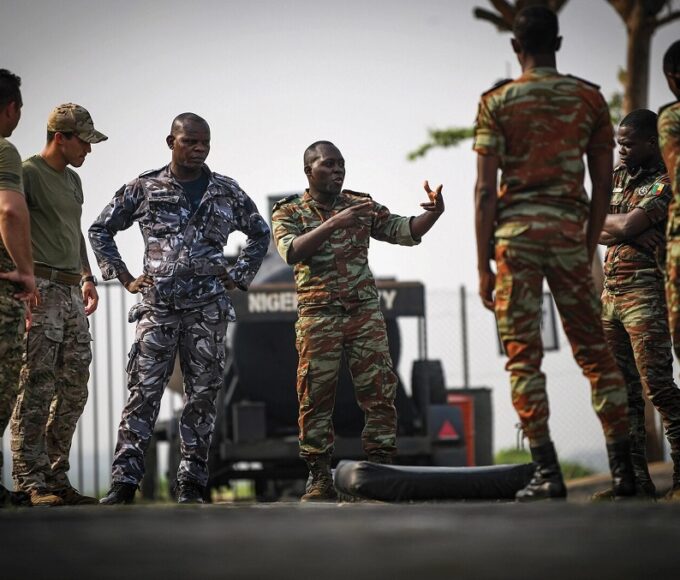Cyberwarfare in the Global South: Lessons for Africa from Abroad
Drawing from the experiences of countries in Latin America, Asia, and the Middle East, this report outlines key lessons Africa must internalise to avoid becoming the next cyber battlefield in global geopolitics.

In today’s digitised battlefield, firewalls are as critical as frontlines, and cyberweapons often precede bullets. From power grids and government websites to military command chains and elections, cyberwarfare has emerged as the new frontier in global security. For the Global South—including Africa—the rising tide of cyber conflict presents both an opportunity for strategic learning and a warning of the vulnerabilities to come.
As African nations expand digital infrastructure, embrace e-governance, and invest in defence modernisation, they must urgently confront the escalating risk of cyberattacks—both domestic and foreign. Drawing from the experiences of countries in Latin America, Asia, and the Middle East, this report outlines key lessons Africa must internalise to avoid becoming the next cyber battlefield in global geopolitics.
Cyberwarfare: A Growing Threat in the Global South
The past decade has seen an exponential rise in cyberattacks targeting the Global South. According to Check Point Research, cyberattacks in Latin America surged by 50% in 2023, while Southeast Asia faced an estimated 2,000 cyber incidents daily, ranging from ransomware to espionage.
Africa has not been immune. In 2023, Nigeria, Kenya, and South Africa ranked among the top five most-targeted countries for cybercrime in the developing world, with sectors like telecommunications, banking, defence, and government administration under relentless digital assault. The African Union Commission itself was reportedly targeted in a prolonged cyberespionage campaign traced back to 2022, involving data exfiltration and surveillance malware.
Despite these threats, many African countries remain critically underprepared. The International Telecommunication Union’s (ITU) 2023 Global Cybersecurity Index ranked only eight African countries in the top 100 for cyber preparedness. This gap presents a stark vulnerability in an era where wars are increasingly waged with keyboards, not Kalashnikovs.
Lessons from the Frontlines: Case Studies from the Global South
- Brazil – Building Institutional Resilience
Brazil’s experience offers important insights for Africa. Following a spate of attacks targeting its electoral systems and military servers in 2018 and 2022, Brazil launched a coordinated national response through its Cyber Defence Command (ComDCiber). The command, housed under the Ministry of Defence, oversees incident response, military cyber drills, and public-private partnerships.
By 2024, Brazil had integrated cyberwarfare units into all military branches and conducted multi-agency simulations. Africa can adopt similar institutional models to unify fragmented cyber operations under national command structures—an urgent need in countries like Nigeria, Ghana, and Ethiopia.
- Indonesia – Fusing Civilian and Military Cyber Capabilities
Indonesia, often underestimated in cybersecurity circles, has become a regional leader through the BSSN (Badan Siber dan Sandi Negara)—a national cybersecurity body that coordinates military, civilian, and intelligence sectors. In 2021, it successfully mitigated a large-scale intrusion targeting its navy and energy infrastructure.
The key takeaway for African states is the importance of cross-sector integration and legal harmonisation. African militaries must work closely with telecom regulators, internet service providers, fintechs, and civil society organisations to build a whole-of-nation approach to cyber defence.
- Iran – Asymmetric Cyber Power
Perhaps no country has turned cyberwarfare into an asymmetric advantage like Iran. Despite international sanctions and limited conventional military strength, Iran has developed one of the most active offensive cyber capabilities in the Global South. Its APT groups—notably APT33 and APT35—have launched cyberattacks on critical infrastructure across the Middle East, the US, and Africa, including attempts to infiltrate East African oil terminals.
African nations must understand that cyber tools can level the playing field. With minimal investment, even small states or non-state actors can punch above their weight, disabling national services or influencing elections. But this also makes Africa vulnerable to becoming a testing ground for foreign cyberweapons.
Africa’s Exposure
Africa’s digital infrastructure is expanding rapidly. By 2025, over 500 million Africans are projected to be connected to the internet, and at least 35 African countries have launched e-government platforms, according to the UN E-Government Development Index. However, this digital leap has not been matched by adequate cyber defences.
Key vulnerabilities include:
- Outdated systems in defence networks, often using legacy platforms that are easily breached.
- Overreliance on foreign cybersecurity tools and contractors, which poses risks of backdoors and data exfiltration.
- Weak cyber laws and enforcement capacity, with only 26 African countries having comprehensive data protection laws as of 2024.
- Lack of trained personnel: Africa currently faces a shortfall of over 500,000 cybersecurity professionals, according to the Africa Cybersecurity Report (2023).
Moreover, with the rise of smart cities, AI-powered surveillance, and military digitalisation, African militaries themselves are becoming attractive targets. The hacking of the Defence Ministry’s procurement portal in Kenya in 2022 and the unauthorised access to Nigeria’s border surveillance feeds in 2023 underscore the urgency of securing Africa’s defence-tech systems.
The Rise of Cyber Militias and Proxy Warfare
Another emerging threat is the rise of cyber militias and proxy actors. In regions like the Sahel, terrorist groups are increasingly using cyber tools for recruitment, financial fraud, and disinformation. Meanwhile, foreign powers are outsourcing cyber-ops to unaffiliated groups, making attribution difficult and retaliation nearly impossible.
The 2023 attacks on Sierra Leone’s electoral commission servers, widely believed to have been coordinated through proxies based outside the continent, are a prime example of this grey-zone warfare. African states must prepare for an era where conflict is not just physical but digital, deniable, and decentralised.
Strategic Recommendations: Building Cyber Resilience in Africa
To secure the continent from digital threats and assert digital sovereignty, African states must move decisively. Here are five actionable recommendations drawn from global best practices:
- Establish National Cyber Commands
Each African country should institutionalise a unified Cyber Defence Command within its military, integrated with civilian cybersecurity agencies. - Adopt Pan-African Cyber Doctrine
The AU and Regional Economic Communities (RECs) must develop a standardised cyber defence doctrine and response mechanism, akin to Article 5 of NATO. - Invest in Cyber Training and Indigenous Tech
Defence academies across Africa should incorporate cybersecurity as a core module. Simultaneously, governments should fund local cybersecurity firms to reduce dependency on foreign tools. - Public–Private Cyber Fusion Cells
Encourage collaboration between banks, telcos, ISPs, and defence ministries to create real-time cyber fusion cells capable of rapid detection and coordinated responses. - Cyberwarfare Simulation and War Games
Regular war-gaming exercises between African militaries and regional tech communities will enhance preparedness and foster innovation in defence strategies.
Africa at the Crossroads
Africa stands at a critical juncture. As cyberwarfare becomes the fifth domain of conflict—alongside land, sea, air, and space—the continent must decide whether to remain a passive victim or become a resilient actor.
The Global South has already shown what is possible: from Brazil’s institutional resilience to Iran’s asymmetric deterrence. Africa must now craft its own path—rooted in sovereignty, regional cooperation, and technological independence.
Without urgent and coordinated action, Africa’s digital gains could easily be reversed by invisible enemies with keystrokes instead of tanks. But with bold leadership and continental solidarity, the continent can transform itself from cyber battleground to cyber power.
Key Cybersecurity Figures (2023–2024):
- 500M+ internet users projected in Africa by 2025 (ITU)
- Only 8 African countries in ITU’s Top 100 Cybersecurity Index
- 500,000 cybersecurity professionals needed across the continent (Africa Cybersecurity Report 2023)
- Africa faced more than 500 major cyber incidents in 2023 alone
- Cybercrime cost African economies over $4 billion in 2023 (Interpol Africa Cyber Threat Report)
Subscribe to African Defence & Security Magazine for expert insights into Africa’s evolving cyber terrain and the continent’s fight to secure its digital sovereignty.
Recent Posts
Categories
- Air & Aerospace16
- Border Security15
- Civil Security4
- Civil Wars4
- Crisis5
- Cyber Security8
- Defense18
- Diplomacy19
- Entrepreneurship1
- Events5
- Global Security Watch6
- Industry8
- Land & Army8
- Leadership & Training5
- Military Aviation5
- Military History27
- Military Speeches1
- More1
- Naval & Maritime9
- Resources2
- Security12
- Special Forces1
- Systems And Technology9
- Tech6
- Uncategorized3
- UNSC1
- Veterans6
- Women in Defence9
Related Articles
GLOBAL SECURITY WATCH – LESSONS FROM NATO FOR AFRICAN REGIONAL DEFENCE COOPERATION
Formed in 1949, the North Atlantic Treaty Organization (NATO) remains the world’s...
ByKing Richard Igimoh, Group Editor ALONovember 4, 2025The BRICS Military Influence: New Alignments, New Threats?
Once seen primarily as an economic bloc with aspirations of reshaping global...
Byadmag_adminJune 27, 2025The Red Sea Corridor: International Naval Presence and African Sovereignty
Few maritime spaces in the world today are as contested, congested, and...
Byadmag_adminJune 27, 2025Africa and NATO: Evolving Strategic Partnerships and Interests
In the aftermath of the Cold War, the global security architecture shifted...
Byadmag_adminJune 27, 2025












